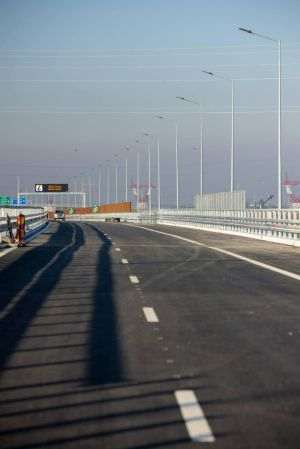I have always wanted to suggest to Important Romanians, or even lecture them on how to be nice to foreigners, and we can now see that it is badly needed - obviously someone at Standard and Poors or Fitch, had a Very Bad Experience in dealing with a Romanian official. I am guessing it was someone from the political arena. Maybe they refused to talk to him, or her, or he/she was kept waiting too long, and decided to downgrade Romania as a result.
How else to explain this rating debacle? The economy is finally on a sound basis, and growing, The Romanian banks are not in crisis, the BNR has good reserves, and the leu, through the well timed interventions of the BNR, has held relatively steady. Mr. Isarescu has been attacked often for keeping the lid on credit expansion in the last two years, but that has turned out to be a wise approach, so that Romania is not as vulnerable as other countries in the EU to the credit crisis. Again, its banks are sound. Internationally, the Government"s borrowing has been maintained at prudent levels. In fact in the financial arena, the word "prudent" is what has shaped policy, at the expense of growth, but avoiding the risks of overheating. It is not unreasonable to assume Mr. Isarescu shared the prescience of many international analysts in foreseeing the sub prime mortgage collapse, and was becoming worried about the foreign property speculators who have descended on Romania in the last years. Romania has a sound monetary policy, firmly applied. What more could investors ask for?
That leaves politics: maybe this rating analyst had, like many foreigners, been bemused and confused by the fluctuating hostilities of the coalition and its satellites, or had concluded that the internecine outbursts of Romanian politicians were having a destabilising effect on the economy. I cannot believe it. These rating agencies are long established, mature and in fact venerable institutions, unimpressed by political whim. They would know well that an excellent sign of democratic maturity is when political in fighting has little or no impact on the daily business of the country, and it is noticeable that the run up to the general election this year seems to be occupying people"s minds, or at any rate, their conversation, a great deal less than in previous years. People are just getting on with their work.
It is also very peculiar that Romania was downgraded just as Hungary in fact had slipped up rather spectacularly, and yet Hungary has escaped ignominy. It is all the more peculiar that Romania should lose investment status when it is a member of the EU, and therefore could be deemed to have a safety net available, should one be required. So strange, that we have to take very seriously the proposition by the editor of this newspaper, that the downgrading came as a direct result of certain foreign bankers trying to cover their positions on margin trades, and they "caught a cold" when Mr. Isarescu put a stop to their happy arrangements. They needed the down grading of Romania"s rating to weaken the leu and allow them to close their positions. I have to say this proposition has a much more likely ring to it, and certainly the comments of Mr. Isarescu in the media recently, and his action in increasing reserve requirements for the banks, would tend to support that proposition rather than to contradict it. It deserves further investigation, at the least.
We can draw a nice parallel with the Great Crash of 1929. JK Galbraith in his book on the subject, describes how everyone in America caught the stock market fever and plunged into margin trading, and how the banks became ever more exposed to the market. How even business enterprises such as oil companies put all their spare cash, not into working capital, but into the banks, to get a share of the profits from these trades. He makes it very clear,moreover, that the Federal Reserve Bank of New York and the Federal Reserve Board failed to intervene significantly to put a stop to the bankers" folly and greed and their failure to act had terrible consequences. It would be nice to think that Mr. Isarescu remembered this story, or even that he just came to the right conclusion: that it was his duty as the Governor of the National Bank, to put a stop to the foreign bankers attempts to raid Romania"s reserves. It would certainly explain his enraged remark that "they" must start to realise that not all the stupid guys are in Romania, and not all the smart guys are foreigners. Are "they" the foreign bankers or Standard and Poor"s?
Meanwhile, it might possibly be seen by frightened foreign investors and upset ratings agencies as a prudent act of the Government to start immediately demonstrating a firm grasp of budgetary control, management of the deficit and sound economic policy almost daily, and unremittingly, and if that does not work, then they could try sending flowers to S&P.
Vivien Ashton was previously on the board of the Romanian Investment Company, an international fund investing in Romania, and was also Adviser to the Bucharest Stock Exchange.




















































